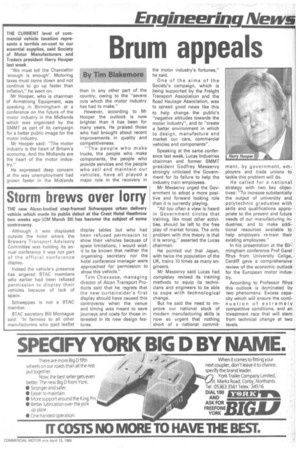Brum appeals
Page 19

If you've noticed an error in this article please click here to report it so we can fix it.
THE CURRENT level of commercial vehicle taxation represents a terrible on-cost to our essential supplies, said Society of Motor Manufacturers and Traders president Harry Hooper last week.
"We must tell the Chancellor 'enough is enough'. Motoring taxes must come down and not continue to go up faster than inflation," he went on.
Mr Hooper, who is chairman of Armstrong Equipment, was speaking in Birmingham at a conference on the future of the motor industry in the Midlands which was organised by the SMMT as part of its campaign for a better public image for the motor industry.
Mr Hooper said: "The motor industry is the heart of Britain's economy. And the Midlands are the heart of the motor industry."
He expressed deep concern at the way unemployment had grown faster in the Midlands than in any other part of the country, owing to the "severe cuts which the motor industry has had to make."
However, according to Mr Hooper the outlook is now brighter than it has been for many years. He praised those who had brought about recent improvements in quality and competitiveness.
"The people who make trucks, the people who make components, the people who provide services and the people who sell and maintain our vehicles, have all played a major role in the recovery in the motor industry's fortunes," he said.
One of the aims of the Society's campaign, which is being supported by the Freight Transport Association and the Road Haulage Association, was to spread good news like this to help change the public's "negative attitudes towards the motor industry", and to "create a better environment in which to design, manufacture and market our cars, commercial vehicles and components".
Speaking at the same conference last week, Lucas Industries chairman and former SMMT president Godfrey Messervy strongly criticised the Government for its failure to help the industry train employees.
Mr Messervy urged the Government to adopt a more positive and forward looking role than it is currently playing.
"All too often a view is heard in Government circles that training, like most other activities, should be left to the free play of market forces. The only problem with this theory is that it is wrong," asserted the Lucas chairman.
He pointed out that Japan, with twice the population of the UK, trains 10 times as many engineers.
Mr Messervy said Lucas had completey revised its training methods to equip its technicians and engineers to be able to cope with technological change.
But he said the need to improve our national stock of modern manufacturing skills is now so urgent that nothing short of a national commit ment, by government, employers and trade unions to tackle this problem will do.
He called for a national strategy with two key objectives: "To increase substantially the output of university and polytechnic graduates with skills and qualifications appropriate to the present and future needs of our manufacturing industries; and to make additional resources available to help employers re-train their existing employees."
In his presentation at the Birmingham conference Prof Garel Rhys from University Colige, Cardiff gave a comprehensive review of the economic outlook for the European motor industry.
According to Professor Rhys this outlook is dominated by two .phenomena. Excess capacity which will ensure the continuation of extremely competitive conditions, and an investment race that will stem from technical change at two levels.




















































































